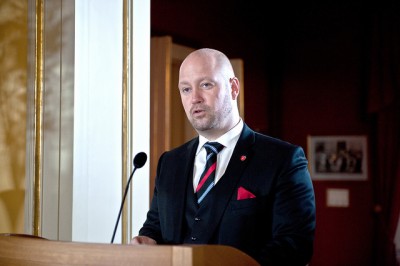Norway’s new Justice Minister has slammed the former Labour government’s handling of immigration policy, and vowed to tighten up the system. Anders Anundsen of the Progress Party (Fremskrittspartiet, Frp) warned the new government won’t spend money accommodating asylum seekers whose claims have been rejected.

Anundsen told Norwegian news bureau NTB he was shocked by the lack of planning or completed projects when he became head of the justice department after the September elections. “Asylum is a rambling challenge where we have 5,000 people who should have been sent out of the country, but sit in asylum centres,” he said. “First, that costs a lot of money, but to linger in a centre is also inappropriate for those who should have been deported. There are a number of these things which I thought would have been underway, but are not.”
Newspaper Aftenposten reported a record high number of asylum seekers were granted permanent residence in Norway in 2013. Of the 11,570 asylum cases processed from 109 different countries, 5,33o or 46 percent were approved. Most have come from Eritrea, Somalia and Syria. More than 5,ooo refugees remain in reception centres, awaiting permanent community settlement as places free up.
However, the issue of asylum seekers remaining in Norwegian centres after their claims have been rejected has become notorious this year. At the start of November a South Sudan refugee who’d been rejected for asylum in Norway stabbed and killed three people on a bus near Årdal. Following the attack, Anundsen said rejected refugees should be held in locked detention centres and deported much more rapidly.
Another issue to grab headlines was the drawn-out “Neda case”, where the Ibrahim family spent 10 years living in a Sandnes refugee centre while they appealed their rejected asylum claim half a dozen times. Neda, the Ibrahim’s 12-year-old daughter became the face of the family’s campaign to stay in Norway, where she and her three siblings had grown up.
The family were deported to Jordan after a nighttime raid on their home in the centre in June.
The case stirred up a storm over the rights of refugee children where their parents’ asylum claims are rejected. NTB reported Anundsen spent December negotiating with the Liberal Party (Venstre) and the Christian Democrats (Kristelig Folkeparti, KrF) over Norway’s approach to asylum seeker children.
“In the area of asylum, the most important thing is to use the least resources possible on asylum seekers with baseless applications,” he said. “We must have fast handling of applications which results in a fast and resolute response for those who have no place here.”
As well as a fundamental review of immigration policy, Anundsen has also promised to overhaul the criminal process in 2014. “As soon as the New Year’s fireworks have finished, people will mark that there is new political leadership in the justice sector.”
newsinenglish.no/Emily Woodgate

